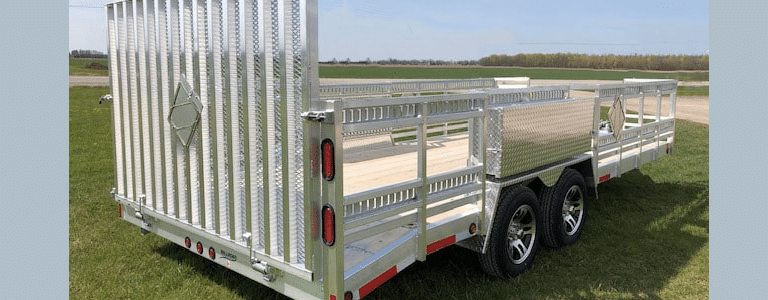
September 28, 2020 Last updated on June 16, 2023 by Bob Fisher Bob Fisher Deckover Trailers
A standard trailer has a low bed that sits between the trailer wheel. A deckover trailer, however, has a deck that rests above the wheels, creating a wider platform and a higher centre of gravity. The deckover setup also allows for more versatility in cargo and towing styles, but not everyone prefers this style.
While the standard trailer is suitable for most jobs, it does not compare to a deckover-style trailer on many points. The versatility of the frame arrangement and the durability of the bed make a deckover system optimal for many towing situations. If you are not sold on this specialized trailer model, then consider the three main benefits a deckover system has over the standard trailer setup.
A standard trailer often restricts the size load you can transport. While load capacities can be similar to a deckover system, you are limited to the width between the wheel wells. While this limitation may not deter some buyers, it is often enough to prevent those interested in large-capacity towing, such as towing RVs, boats or even large campers.
Deckover models are not as restrictive as standard trailers because of the design. By placing the deck above the wheels, your trailer bed gains a significant amount of square footage, meaning that the transportation of wider and heavier loads is not only possible but made easy on deckover trailers. Beyond the ease of transport, deckovers are simple to load and unload.
Standard trailers may have ramps for loading vehicles and other items, but when using forklifts, the wheel wells can get in the way. A deckover-style trailer eliminates the problem for forklifts because the upper deck is flat and level across the trailer platform. There is no need to arrange around the wheels, leaving wasted space where other pallets could have gone.
A deckover dump trailer also has benefits. As well as the advantage of more space in the dumpster bed, a deckover dump trailer also has a higher dump angle because of its placement above the wheels. The higher angle makes it easier to clear the dumpster of any materials.
While it may seem inconsequential in some cases, a standard trailer is not well-suited for the transportation of complex loads or loads of varying sizes of materials. Often, because of forklift limitations, a company is not able to utilize the full surface area of a standard trailer. A deckover option, alternatively, allows for easy maneuvering and stacking of cargo, which helps a company maintain operational budgets.
When a business is forced to haul multiple loads instead of only one, it costs. The fuel, employee time and logistical complications all add up to less profit. A deckover system, with its wide platform and flat design, ensures maximum transportation capabilities. Therefore, a company can save money through logistics and possibly get cargo to customers in less time.
While the deckover trailer has many benefits over the standard trailer setup, it is not always the better choice. Companies and individuals must weigh the pros and cons against their list of specific requirements. You also need to consider the towing capabilities of your vehicle and how a deckover system may affect the maneuverability.
For many companies, a deckover trailer is the best and most cost-effective solution. It also may be the right trailer for personal travel, depending on your transportation needs. To learn if a deckover system is right for you, the best thing to do is to talk to a manufacturer. Contact Millroad Manufacturing to discuss the benefits of deckover options and how such a trailer can work for you.